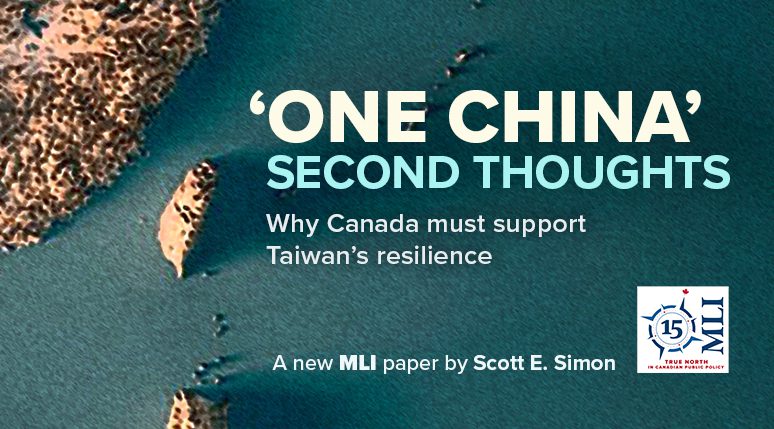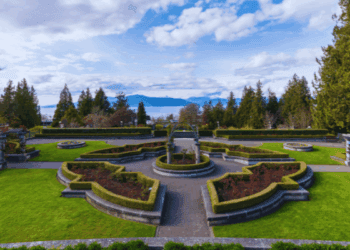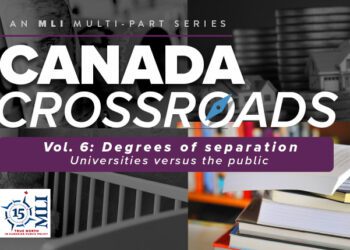By Scott E. Simon
April 29, 2025
Executive Summary | Sommaire (le français suit)
The People’s Republic of China (PRC) is an increasingly disruptive global power and a growing challenge to Canada. One substantial risk is that the PRC intends to annex Taiwan, which it has never controlled, and it does not rule out the option of military force. China’s increasing rate of military exercises around Taiwan indicate that it is preparing for aggression. Even limited conflict in the region would inevitably disrupt international trade and supply chains, thus triggering economic disruption on a scale not seen since the Second World War. Moreover, a Chinese takeover through coercion or force would violate the human rights of the Taiwanese people. Canada needs clarity about the international status of Taiwan in order to recalibrate policies in changing circumstances.
China’s strategy begins with international lawfare – trying to convince the world that Taiwan has always been an integral part of China and that no external powers can legally intervene in the event of a conflict. China’s most recent lawfare strategy is its argument that the United Nations General Assembly Resolution 2758 (GA 2758), which gave China a seat in the UN, recognized that Taiwan is part of China. This is blatant misinformation. A study of UN debates at the time shows that UN member states expressed strong reservations about formulations that would justify transferring Taiwan to China without the consent of its people. This is why the resolution does not even mention Taiwan. China nowadays tries to coerce states, especially developing countries that need Chinese assistance, to declare that GA 2758 made Taiwan part of the PRC. This lawfare is intended to set the stage for a conflict by minimizing the possibility that the General Assembly would support Taiwan the way that it supported Ukraine after the Russian invasion. To push back, democratic states, including Canada, have passed motions recognizing that GA 2758 did not establish China’s sovereignty over Taiwan and does not determine its future status.
Canada has always been clear about the fact that Taiwan is not part of the PRC. In 1970, when Canada established diplomatic relations with the PRC, Canada refused China’s requests to recognize Chinese sovereignty over Taiwan. Canada only agreed to “take note” of China’s position, while calling it inappropriate either to endorse or challenge China’s claims. This means that Canada’s own “One-China Policy,” recognizing the PRC as the sole government of China, remains silent about Taiwan’s status for reasons of diplomatic expediency. Part of the difficulty was that Taiwan was then occupied by a government (the Republic of China) that had moved to Taiwan after losing the 1949 Chinese Civil War, still claimed to represent all of China, and suppressed the Taiwanese people under martial law. Canadian leaders hoped that eventually the people of Taiwan would have a say in their own future and kept open the possibility of establishing relations with Taiwan when circumstances changed.
Since the 1970s, Taiwan has democratized. The Taiwanese people now elect a president and a legislative body who have exclusive jurisdiction over Taiwan. Because of PRC pressure, no state can have diplomatic relations with both China and Taiwan and Taiwan is excluded from the UN. Nonetheless, Taiwan joins trade organizations as a “customs territory,” has substantive relations with most countries, and its passport is one of the strongest in the world. Taiwan, even if it is still called the Republic of China, meets all of the criteria for statehood in the Montevideo Convention. Canadian courts have even judged that Taiwan must be treated as a state in their jurisdictions, even if the government denies formal recognition of Taiwan for the sake of diplomacy with China.
Canadian policy is already based on the knowledge that Taiwan is completely autonomous from PRC rule, which is why Canada promised in its Indo-Pacific Strategy to protect Taiwan’s resilience. This requires clarity within Canada, including making a clear public distinction between the “One-China Principle” that China wants to impose on the world and our own “One-China Policy.” As a sovereign state, Canada has the right to define that policy and determine our own relationship with Taiwan without external interference. There are many actions that Canada can take in the short-, intermediate-, and long-term to strengthen Taiwan’s resilience, prepare for unwanted contingencies, and lay the groundwork for the people of Taiwan to eventually fully exercise their right to self determination as promised in international law.
The goal is to preserve the status quo of peace and security in the Taiwan Strait in protection of Canada’s interests. Key actions include:
• With our allies, continue naval transits of the Taiwan Strait and diplomatic efforts promoting peace and stability. These actions need to be accompanied by public diplomacy clearly stating that the Taiwan Strait constitutes international waters under international law, and that stability and freedom of navigation in the region is a global public good.
• Make it clear to the Canadian public that there is a difference between Canada’s own “One-China Policy” and the “One-China Principle” promoted by the PRC. The Canadian public must know about the importance of Taiwan to Canada, and understand that our actions are intended to protect Canadian interests. This can help us counter disinformation from China and its enablers in Canada.
• Convey to the Taiwanese people through public diplomacy that the international community supports their democracy. Signs of external support can help the Taiwanese people avoid the sense of isolation that makes them vulnerable to PRC cognitive warfare.
• Deepen co-operation with Taiwan, as well as neighbouring states of Japan, the Republic of Korea, and the Philippines, on defence, security, law enforcement, and intelligence sharing, in ways that collectively deter Chinese aggressive actions.
• Expand bilateral trade and investment with Taiwan in ways that enhance supply chain resilience. This includes tightening collaboration on semiconductors and AI, as well as the supply of Canadian minerals and energy solutions to Taiwan.
La République populaire de Chine (RPC) se positionne comme une force mondiale de plus en plus perturbante, un problème croissant pour le Canada. L’un des risques majeurs posés tient à son projet d’annexer Taïwan, qui n’a jamais été sous son contrôle – sans écarter la possibilité d’une intervention militaire. L’intensification de ses manœuvres autour de l’État insulaire suggère qu’elle se prépare à une attaque. Même limité, un conflit dans cette région nuirait forcément au commerce international et aux chaînes d’approvisionnement, provoquant des difficultés économiques à une échelle jamais vue depuis la Seconde Guerre mondiale. De plus, une prise de contrôle par la force porterait atteinte aux droits de la personne du peuple taïwanais. Pour pouvoir adapter ses politiques en fonction des circonstances, le Canada a besoin d’éclaircissements sur le statut international de Taïwan.
La stratégie de la Chine repose en tout premier lieu sur l’instrumentalisation du droit international : elle tente de convaincre le monde que Taïwan a toujours fait partie intégrante de son territoire et qu’aucune puissance étrangère ne peut intervenir légalement en cas de conflit. Sa tactique juridique la plus récente consiste à affirmer que la résolution 2758 de l’Assemblée générale des Nations Unies, qui octroie à la Chine un siège à l’ONU, reconnaît que Taïwan fait partie de la Chine. Cette affirmation est pour le moins fallacieuse. En effet, une étude des discussions tenues à l’ONU à l’époque révèle que les États membres ont émis de fortes objections quant aux termes susceptibles de légitimer le transfert de Taïwan à la Chine sans l’accord de sa population, et c’est pourquoi la résolution omet toute référence à Taïwan. À présent, la Chine tente de contraindre d’autres États, en particulier les pays en développement dépendant de son soutien, à affirmer que la résolution 2758 fait de Taïwan un territoire chinois. Cette guerre juridique a pour objectif de créer les conditions propices à un conflit en minimisant la probabilité que l’Assemblée générale appuie Taïwan comme elle l’a fait pour l’Ukraine à la suite de l’invasion russe. En guise de riposte, certains pays démocratiques, dont le Canada, ont adopté des motions affirmant que la résolution 2758 ne confère pas la souveraineté de la Chine sur Taïwan et ne détermine pas son statut futur.
Le Canada a toujours été explicite : Taïwan ne fait pas partie de la RPC. Quand le Canada a noué des liens diplomatiques avec la RPC, en 1970, il a catégoriquement refuse de reconnaître, à sa demande, la souveraineté chinoise sur Taïwan. Le Canada s’est alors contenté de « prendre note » de la position de la Chine, affirmant qu’il serait inapproprié d’approuver ou de contester ses revendications. Sa propre politique d’une seule Chine, qui reconnaît la RPC comme le seul gouvernement de la Chine, doit donc demeurer silencieuse sur la question du statut de Taïwan par opportunisme diplomatique. Il en est ainsi parce que Taïwan était gouvernée à l’époque par un régime (République de Chine) qui s’était replié sur son territoire à la suite de sa défaite (guerre civile chinoise de 1949). Ce régime prétendait toujours représenter l’ensemble de la Chine, tout en maintenant le peuple taïwanais sous la loi martiale. Les dirigeants canadiens espéraient que le peuple taïwanais pourrait un jour décider de son propre destin et gardaient donc la porte ouverte à l’établissement de relations avec Taïwan en fonction des circonstances.
Taïwan a adopté un régime démocratique au cours des années 1970. Le peuple taïwanais élit désormais un président et des organes représentatifs qui détiennent une compétence exclusive sur Taïwan. Du fait des contraintes imposées par la RPC, aucun pays ne peut établir de relations diplomatiques simultanément avec la Chine et Taïwan, et Taïwan n’est pas représentée au sein des Nations Unies. Néanmoins, Taïwan est membre d’institutions internationales en tant que « territoire douanier », maintient d’excellentes relations avec la majorité des pays et émet l’un des passeports parmi les plus puissants au monde. Taïwan, même si on la désigne encore sous le nom de République de Chine, satisfait à tous les critères établis par la Convention de Montevideo concernant l’accession à l’indépendance. Les tribunaux canadiens ont même statué que Taïwan devait être considérée comme un État dans leurs domaines de compétence, malgré le refus du gouvernement de reconnaître officiellement Taïwan en raison de ses relations diplomatiques avec la Chine.
Pour résumer, la politique canadienne est déjà fondée sur la notion que Taïwan est totalement indépendante du régime communiste, raison pour laquelle le pays s’est engagé, dans sa stratégie indopacifique, à préserver sa résilience. Cela exige de définir clairement la distinction entre le « principe d’une seule Chine » que la Chine souhaite imposer à l’échelle mondiale et notre propre politique d’une seule Chine. Comme nation souveraine, le Canada a le droit de définir cette politique et de gérer ses propres relations avec Taïwan sans intervention extérieure. Le Canada dispose d’options diverses à court, moyen et long terme pour renforcer la résilience de Taïwan, se préparer à toute éventualité et instaurer un environnement favorable permettant au peuple taïwanais d’exercer intégralement son droit à l’autodétermination, comme stipulé par le droit international.
L’objectif est de maintenir le statu quo en matière de paix et de sécurité dans le détroit de Taïwan pour sauvegarder les intérêts canadiens. Voici les principales actions à mener :
• Poursuivre les traversées du détroit de Taïwan et les efforts diplomatiques en faveur de la paix et de la stabilité, conjointement avec nos partenaires. Il est impératif que ces mesures soient soutenues par une diplomatie qui déclare publiquement que le détroit de Taïwan fait partie des eaux internationales selon le droit international, et que la stabilité et la liberté de navigation dans la région constituent un bien commun mondial.
• Expliquer clairement au public canadien qu’il y a une distinction entre la politique canadienne dite d’« Une seule Chine » et le principe d’une seule Chine défendu par la RPC. Il doit comprendre l’importance de Taïwan pour le Canada et savoir que nos initiatives sont destinées à défendre les intérêts canadiens. Cela pourrait nous aider à combattre la désinformation provenant de la Chine et de ses partisans au Canada.
• Témoigner au peuple taïwanais du soutien de la communauté internationale pour sa démocratie par le biais de la diplomatie publique. Les signes d’appui international peuvent aider les Taïwanais à réprimer le sentiment d’isolement qui les rend vulnérables face à la guerre cognitive menée par la RPC.
• Renforcer la coopération avec Taïwan, ainsi qu’avec les pays voisins – le Japon, la République de Corée et les Philippines – en matière de défense, de sécurité, d’application de la loi et d’échange de renseignements, de manière à repousser collectivement les actions agressives de la Chine.
• Accroître le commerce et les investissements bilatéraux avec Taïwan pour fortifier la résilience de la chaîne d’approvisionnement. Il s’agit notamment de resserrer la collaboration dans les domaines des semi-conducteurs et de l’IA, ainsi que l’approvisionnement de Taïwan en minéraux et en solutions énergétiques canadiennes.







